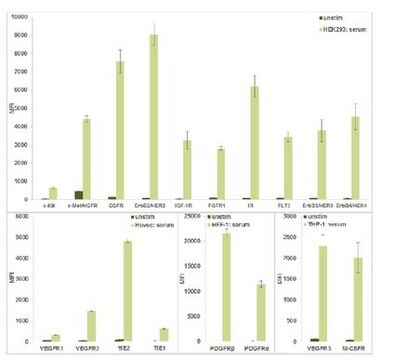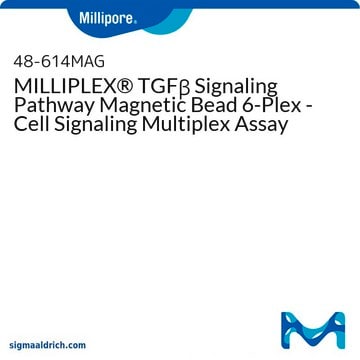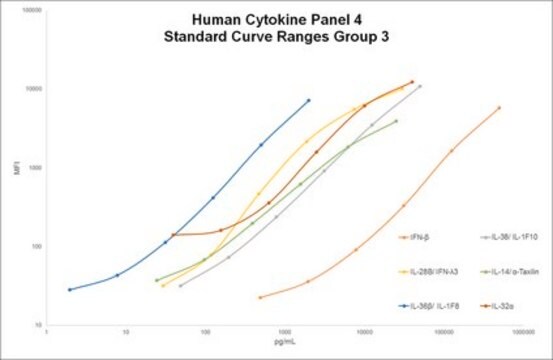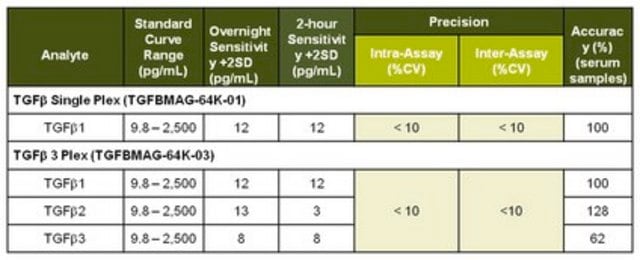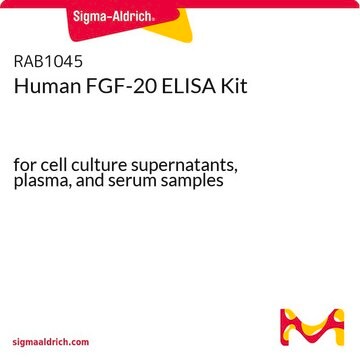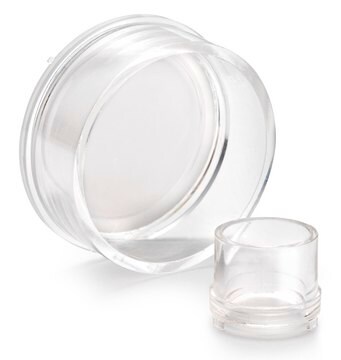TGFBMAG-64K-01
MILLIPLEX® TGFß1 Magnetic Bead Single Plex Kit - Immunology Multiplex Assay
This Immunology Multiplex Assay is used for the simultaneous quantification of the TGF-β1 biomarker in the following species: Mouse/Human/Rat/Pig/Horse/Rabbit/Guinea Pig/Hamster.
Synonym(s):
Luminex® cytokine immunoassay, Millipore TGF beta kit, transforming growth factor beta 1 kit
About This Item
Recommended Products
Quality Level
species reactivity
rat, canine, feline, nonhuman primates, mouse, human, pig
manufacturer/tradename
Milliplex®
assay range
accuracy: 100%
sensitivity: 12 pg/mL
standard curve range: 9.8-2,500 pg/mL
technique(s)
multiplexing: suitable
compatibility
configured for Single Plex
detection method
fluorometric (Luminex xMAP)
shipped in
wet ice
General description
The MILLIPLEX® TGFβ1 Single Plex Magnetic Bead Kit is a single plex kit to be used for the quantification of TGFβ in serum, plasma, tissue/cell lysate and culture supernatant
samples.
The Luminex® xMAP® platform uses a magnetic bead immunoassay format for ideal speed and sensitivity to quantitate multiple analytes simultaneously, dramatically improving productivity while conserving valuable sample volume.
Panel Type: Cytokines/Chemokines
Specificity
Application
- Analyte: TGFβ1
- Recommended Species: In addition to human TGFβ1, the assay can detect TGFβ1 in serum of the following: horse, rabbit, mouse, rat, mini pig, canine, hamster, guinea pig, rhesus monkey and cynomolgus monkey. However, the exact amount of cross reactivity has not been determined.
- Recommended Sample Type: Serum, plasma, cell/tissue culture supernatants and lysates
- NOTE: This assay requires a sample acidification treatment using the provided reagents and protocol.
- Recommended Sample Dilution: 25 μL per well of a 1:30 dilution after acidification treatment of serum and plasma samples; cell/tissue culture samples may require dilution prior to acidification treatment (see protocol for details).
- Assay Run Time: Overnight (16-18 hours) at 2-8°C or alternatively, 2 hours at room temperature (20-25°C).
- Research Category: Inflammation & Immunology
- Research Subcategory: Cardiovascular Disease, Chronic Inflammatory Disease, Immune Disorders, Inflammatory Disease, Rheumatoid Arthritis
Packaging
Storage and Stability
Legal Information
Disclaimer
Signal Word
Danger
Hazard Statements
Precautionary Statements
Hazard Classifications
Acute Tox. 4 Dermal - Aquatic Chronic 2 - Eye Dam. 1 - Met. Corr. 1 - Skin Corr. 1A - Skin Sens. 1
Storage Class Code
8A - Combustible corrosive hazardous materials
Regulatory Listings
Regulatory Listings are mainly provided for chemical products. Only limited information can be provided here for non-chemical products. No entry means none of the components are listed. It is the user’s obligation to ensure the safe and legal use of the product.
PDSCL
Please refer to KIT Component information
PRTR
Please refer to KIT Component information
FSL
Please refer to KIT Component information
ISHL Indicated Name
Please refer to KIT Component information
ISHL Notified Names
Please refer to KIT Component information
Cartagena Act
Please refer to KIT Component information
JAN Code
キットコンポーネントの情報を参照してください
Certificates of Analysis (COA)
Search for Certificates of Analysis (COA) by entering the products Lot/Batch Number. Lot and Batch Numbers can be found on a product’s label following the words ‘Lot’ or ‘Batch’.
Already Own This Product?
Find documentation for the products that you have recently purchased in the Document Library.
Related Content
Learn the benefits of using biomarker detection multiplex immunoassays for laboratory, companion, and agricultural animal research and explore MILLIPLEX® multiplex assays for veterinary medicine and animal health research.
Learn how multiplexing with MILLIPLEX® multiplex assays can help simplify cancer research by measuring multiple circulating biomarkers at once. Find multiplex panels to analyze JAK-STAT, mTOR, MAPK, SAPK, TGFβ signaling pathways, and more.
See how multiplexing the inflammation signaling pathway with MILLIPLEX® inflammation assays or cell signaling assays can help researchers bridge the gap between immunology and cell signaling, including investigating T cell signaling, Th Cell differentiation, inflammatory response signaling, and sepsis signaling.
Our team of scientists has experience in all areas of research including Life Science, Material Science, Chemical Synthesis, Chromatography, Analytical and many others.
Contact Technical Service
